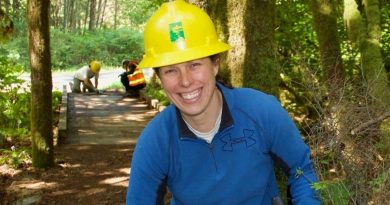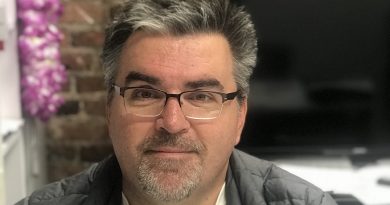Professor spotlight: Meet Dr. Chris Beasley
Dr. Chris Beasley is an assistant professor of psychology, with his field of expertise being community psychology. Between grading papers and working with previously incarcerated students, Dr. Beasley was able to sit down with the Ledger and answer some questions regarding both on- and off-campus subjects.
WHERE DID YOU ATTEND COLLEGE FOR YOUR UNDERGRAD DEGREE AND GRAD SCHOOL?
I started going to college at Lincoln Trail Community College. At that time, I was just going to get a two-year degree in human services, and later in psychology … As I was doing well in that program and as I visited a university campus in that duration, I thought this could be a place that I would want to be. So then I decided to pursue a Bachelor’s, started by taking classes at Eastern Illinois University for a degree in computer science, and transferring to University of Minnesota-Duluth for a degree in psychology. For grad school, I attended a clinical psychology master’s program at Roosevelt University, as well as a Ph.D. from DePaul University.
WHAT STEMMED YOUR INTEREST IN PSYCHOLOGY?
My dad, who’s since passed away, had schizoaffective disorder which is a combination of schizophrenia and bipolar disorder … I wanted to understand that a little more and help people, and that was what originally drew me into psychology. I also was struggling with addiction at the time, and as I got into psychology a little more, I started to realize a little more about my addiction.
YOU HAVE BEEN KNOWN ON CAMPUS FOR YOUR RESEARCH STUDIES AND PROJECTS. CAN YOU EXPLAIN SOME OF YOUR WORK?
There are a couple of projects I’m currently working on. One is starting a research lab to study the transitions from prison to college called the Post-Prison Education Research Lab. Also, at UWT, I am leading the development of The Husky Post-Prison Pipeline. This is to better support students who are coming out of prison who want to attend UWT, while also hoping to partner up with some community colleges who are already doing work in this area. I have been helping lead the development of a consortium of prison and post-prison education programs in the state of Washington. Finally, I have co-founded a nonprofit national network called the Formerly Incarcerated College Graduates Network, which is up to about a thousand people now across 41 different states plus the District of Columbia.
WHAT DO YOU LIKE BEST ABOUT TEACHING AT UWT?
I really like the students at UWT. I have worked at a couple other institutions, and what I found here was that the students are just really hungry to get involved in stuff, which is really cool. They want to make change, get more involved in the community and they actually want to do something to make not only the campus, but the world a better place. Believe it or not, not all places are like this, and I appreciate working with the students here.
WHAT IS THE HARDEST PART ABOUT BEING A PROFESSOR?
It’s probably just trying to find the time to do all the things I want to do. I want to do so much good in my lifetime, but where do I find the time? It’s trying to strike a balance between work and home life, because there really is no end time for your job. Making time for my husband and my dog when I enjoy my work so much is really hard to balance. You really need to learn to set personal boundaries.
WHAT ARE SOME OF YOUR HOBBIES BESIDES WORKING?
The social change stuff is hard to label “work” or a “hobby” because I really love it. The more that I have done this work, it’s the more I realize you can actually change the world, and that is all I want to do. I also really love camping and hiking — I love those two things. I keep thinking I’m going to check out the treehouses in Washington, so it’s going on my bucket list!
WHAT ADVICE CAN YOU GIVE UNDERGRAD STUDENTS?
I would say undergrad is figuring out what you want to do in the world. Try to figure out what you’re passionate about, but also find out what you’re good at. Sometimes they don’t match, but if you mesh those two together, passion and skill, then that can make for a great career.
Fun Facts About Dr. Chris Beasley:
• Dr. Beasley is passionate about traveling and has gone to South Korea, the
Philippines, Shanghai, Tokyo, Hawaii and multiple states across the continental U.S.
• He brings home different cultural norms from the places he’s
traveled to to share and use on a normal basis.
• He can say the ABCs backwards.
• He loves to train his labradoodle, Ru, named after RuPaul.






